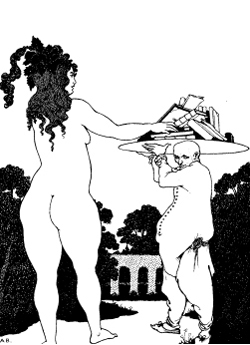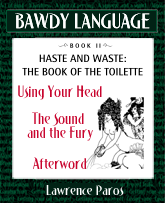Bawdy Language: Book Excerpts
As a public service, to advance the world's awareness and understanding of the origins of curse words, swear words, dirty talk, and sexual slang, and to whet your appetite for more, we offer for your pleasure a page from each chapter. These samplers provide a good sense of the subject matter of each chapter, each of which is self contained. They are cool both for reading and as a gift. Individual chapters can be downloaded at a mere $1.99 each. Such a bargain!
Words to the Wise: Book I - The Erotic Tongue
The Erotic Tongue
Haste Makes Waste: The Book of the TOILETTE

Banish the use of those four-letter words
Whose meanings are never obscure.
The Angles and Saxons, those bawdy old birds,
Were vulgar, obscene and impure.
But cherish the use of the weak-kneed phrase
That never quite says what you mean;
Far better to stick with your hypocrite ways
Than be vulgar or coarse or obscene.
— Anon., "Ode to Those Four-Letter
Words," 20thC


The Moral Majority considers them obscene. Feminists point out their aggressive character and the contempt they show toward women. Children love them, however, finding them useful for dramatic effect, for capturing the attention of the adult world and making it more responsive to their presence. Adults also find occasion to deploy these words as a declaration of independence, an editorial statement against the forces of restraint and convention, or as one commentator described their use, "an oral fart of sorts."
But there is much more to the lexicon than the four-letter words and their friends. We also have technical and scientific words, as well as those that are refined and even border on the poetic.
Euphemisms (from the Greek "to sound well") make up a good part of Bawdy Language. They are neat little rhetorical devices by which we cloak otherwise naked thoughts.
We take a taboo word and rephrase it with sufficient taste and delicacy as to make it acceptable. There are many ways to euphemize a word: We can render it somewhat abstract; we can make up words that are longer and more complex, bigger being better; we can understate, use indirection, or simply substitute a foreign word. Euphemisms, however, are not without their problems. They can be uninspiring, unimaginative, and escapist. Another difficulty is that once having attained a certain popularity, they become so closely identified with the words they are meant to replace that they themselves come to be considered obscene. A euphemism's life is not an easy one. As Ernest Weekly pointed out in 1930 in his Romance of Words, the euphemism is by inevitable association doomed from its very birth.
11

